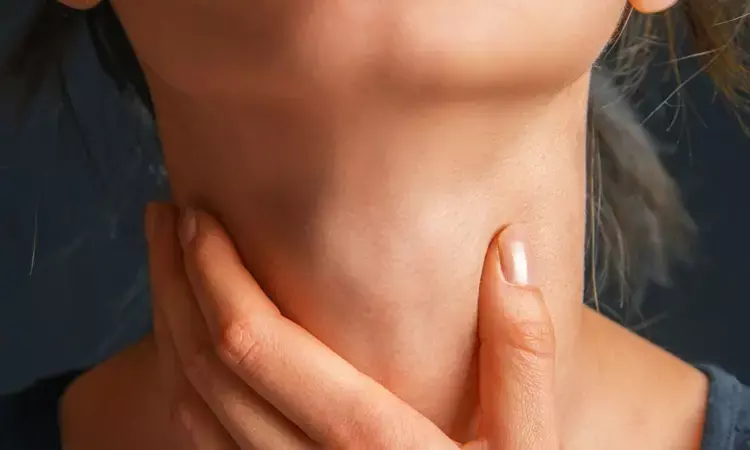- Home
- Medical news & Guidelines
- Anesthesiology
- Cardiology and CTVS
- Critical Care
- Dentistry
- Dermatology
- Diabetes and Endocrinology
- ENT
- Gastroenterology
- Medicine
- Nephrology
- Neurology
- Obstretics-Gynaecology
- Oncology
- Ophthalmology
- Orthopaedics
- Pediatrics-Neonatology
- Psychiatry
- Pulmonology
- Radiology
- Surgery
- Urology
- Laboratory Medicine
- Diet
- Nursing
- Paramedical
- Physiotherapy
- Health news
- Fact Check
- Bone Health Fact Check
- Brain Health Fact Check
- Cancer Related Fact Check
- Child Care Fact Check
- Dental and oral health fact check
- Diabetes and metabolic health fact check
- Diet and Nutrition Fact Check
- Eye and ENT Care Fact Check
- Fitness fact check
- Gut health fact check
- Heart health fact check
- Kidney health fact check
- Medical education fact check
- Men's health fact check
- Respiratory fact check
- Skin and hair care fact check
- Vaccine and Immunization fact check
- Women's health fact check
- AYUSH
- State News
- Andaman and Nicobar Islands
- Andhra Pradesh
- Arunachal Pradesh
- Assam
- Bihar
- Chandigarh
- Chattisgarh
- Dadra and Nagar Haveli
- Daman and Diu
- Delhi
- Goa
- Gujarat
- Haryana
- Himachal Pradesh
- Jammu & Kashmir
- Jharkhand
- Karnataka
- Kerala
- Ladakh
- Lakshadweep
- Madhya Pradesh
- Maharashtra
- Manipur
- Meghalaya
- Mizoram
- Nagaland
- Odisha
- Puducherry
- Punjab
- Rajasthan
- Sikkim
- Tamil Nadu
- Telangana
- Tripura
- Uttar Pradesh
- Uttrakhand
- West Bengal
- Medical Education
- Industry
Selenium supplementation improves thyroid measures in Hashimoto thyroiditis: Study

Switzerland: Selenium supplementation may improve key thyroid measures in patients with Hashimoto thyroiditis (HT) who are not treated with thyroid hormone replacement therapy (THRT), according to a recent meta-analysis of randomized clinical trials (RCTs).
"Selenium is safe and effective in lowering thyrotropin (TSH), thyroid peroxidase antibodies (TPOAb), and malondialdehyde (MDA) levels in patients with Hashimoto thyroiditis without THRT. The indications for TPOAb lowering were found independent of THRT," the researchers reported in their study published in Thyroid.
Hashimoto thyroiditis is the most common cause of hypothyroidism in iodine-sufficient areas. Selenium is an essential trace element required for synthesising thyroid hormone and exerts antioxidant effects. Therefore, it may be of utility in the management of HT. Considering this, Valentina V. Huwiler, University of Bern, Bern, Switzerland, and colleagues aimed to perform an updated systematic review and meta-analysis of RCTs investigating the effect of selenium supplementation on HT, particular attention was paid to thyroid function, immune markers, ultrasound findings, thyroid antibodies, patient-reported outcome, and safety. They hypothesized that subgroup analyses would help them define indications for potential benefits.
The researchers evaluated the effect of selenium supplementation on thyroid function (TSH, free and total thyroxine [fT4, T4], free and total triiodothyronine [fT3, T3]), thyroglobulin antibodies [TGAb], thyroid antibodies (thyroid peroxidase antibodies [TPOAb], thyrotropin receptor antibody [TRAb]), thyroglobulin antibodies [TGAb], immune markers, patient-reported outcomes, ultrasound findings (echogenicity, thyroid volume), and adverse events in HT.
The research team systematically searched the online databases from inception to January 2023 and searched citations of eligible studies. Two independent authors reviewed and coded the identified literature.
The study's primary outcome was TSH in patients without thyroid hormone replacement therapy; the others were considered secondary outcomes. Results were synthesized as standardized mean differences (SMD) or odds ratio (OR), risk of bias was assessed using the Cochrane RoB 2 tool. Evidence was rated using the GRADE (Grading of Recommendations Assessment, Development, and Evaluation) approach.
The researchers screened 687 records and included 35 unique studies. Upon analysis, they reported the following findings:
- Selenium supplementation decreased TSH in patients without THRT (SMD −0.21; 7 cohorts, 869 participants).
- In addition, TPOAb (SMD −0.96; 29 cohorts; 2358 participants) and malondialdehyde (MDA; SMD −1.16; 3 cohorts; 248 participants) decreased in patients with and without THRT.
- Adverse effects were comparable between the intervention and control groups (OR 0.89; 16 cohorts; 1339 participants).
- No significant changes were observed in fT4, T4, fT3, T3, TGAb, thyroid volume, interleukin (IL)-2, and IL-10. Overall, the certainty of evidence was moderate.
"Our study suggests that selenium supplementation is safe and holds potential as a disease-modifying factor for HT-associated hypothyroidism," the researchers wrote.
"Further research is needed to confirm its efficacy, elucidate its cost-effectiveness, and fully understand its mechanism of action," they concluded.
Reference:
Valentina V. Huwiler, Stephanie Maissen-Abgottspon, Zeno Stanga, Stefan Mühlebach, Roman Trepp, Lia Bally, and Arjola Bano. Selenium Supplementation in Patients with Hashimoto Thyroiditis:A Systematic Review and Meta-Analysis of Randomized Clinical Trials. Thyroid®.ahead of printhttp://doi.org/10.1089/thy.2023.0556
Dr Kamal Kant Kohli-MBBS, DTCD- a chest specialist with more than 30 years of practice and a flair for writing clinical articles, Dr Kamal Kant Kohli joined Medical Dialogues as a Chief Editor of Medical News. Besides writing articles, as an editor, he proofreads and verifies all the medical content published on Medical Dialogues including those coming from journals, studies,medical conferences,guidelines etc. Email: drkohli@medicaldialogues.in. Contact no. 011-43720751


